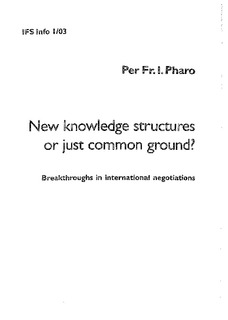| dc.contributor.author | Pharo, Per Fr. I. | |
| dc.date.accessioned | 2011-11-04T13:20:10Z | |
| dc.date.available | 2011-11-04T13:20:10Z | |
| dc.date.issued | 2003 | |
| dc.identifier.issn | 0803-1061 | |
| dc.identifier.uri | http://hdl.handle.net/11250/99677 | |
| dc.description | Why do breakthroughs in international negotiations happen; and why at a given time? This study evaluates the explanatory power of two theoretical approaches regarding the agreement between Soviet Premier N. Krushchev and US President J. F. Kennedy on the Limited Test Ban Treaty (LTBT) in 1963. How can this agreement best be explained? Was the agreement facilitated by the emergence of new knowledge structures, as the cognitive mapping approach argues? Or is a more nuanced interpretation of the Test Ban negotiations necessary to explain why the LTBT was reached? | no_NO |
| dc.language.iso | eng | no_NO |
| dc.publisher | Institutt for Forsvarsstudier | no_NO |
| dc.relation.ispartofseries | IFS Info;1 | |
| dc.subject | internasjonale forhandlinger | no_NO |
| dc.title | New knowledge structures or just common ground?: breakthroughs in international negotiations | no_NO |
| dc.type | Others | no_NO |
| dc.source.pagenumber | 21 s. | no_NO |
